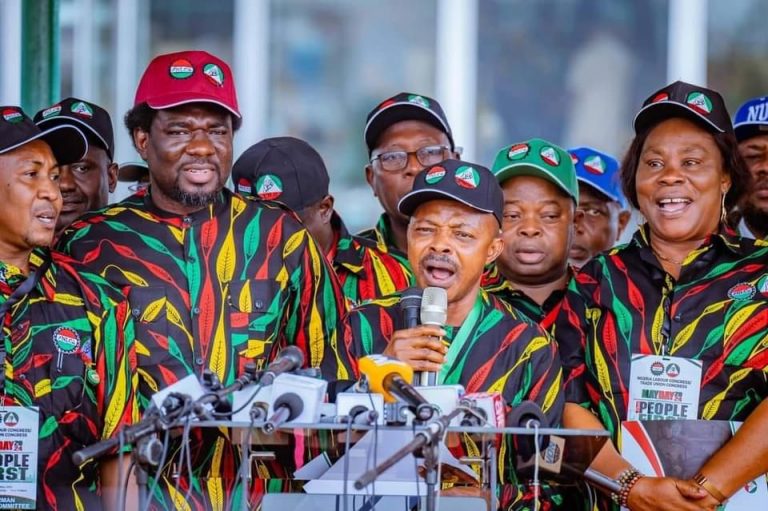
In his nationwide broadcast to mark Democracy Day, President Bola Tinubu claimed that an agreement had been reached on new national minimum salaries, which was rejected by organised labour. Tinubu stated that the Federal Government and organised labour had reached an agreement on the long-debated new minimum wage.
Tinubu disclosed in his nationwide broadcast to commemorate 2024 Democracy Day in Abuja on Wednesday that an executive bill will be forwarded to the nationwide Assembly shortly to formalize the new minimum wage accord. In responding to labor union demands, the President emphasized that his administration preferred a democratic approach over a dictatorial one.
However, in a statement issued on Wednesday, the acting President of the Nigeria Labour Congress, Prince Adewale Adeyanju, stated that the Tripartite Committee on the National Minimum Wage had not reached an agreement by the time deliberations ended on Friday, June 7, 2024. Adeyanju added that two amounts, N250,000 from Organized Labour and N62,000 from the government and Organized Private Sector, were arrived at and should have been presented to the President.
The Labour leader declared that anything to the contrary was not only doctored, but would not be accepted by Labour.
The statement continues, “We emphasize that it will be extremely difficult for Nigerian workers to accept any national minimum wage amount that approaches a starvation pay. We cannot work and remain in abysmal poverty.. “The Nigeria Labour Congress (NLC) paid close attention to His Excellency, Senator Bola Ahmed Tinubu’s, Democracy Day Presidential address, particularly in light of the ongoing National Minimum Wage discussions. While the President may have accurately described certain aspects of our democratic journey’s past, it is clear that he was incorrect about the outcome of the wage negotiating process.
“To quote Mr. President; “As we continue to improve the economy, I will always listen to the people and never turn my back on you. In this spirit, we have engaged in good faith and open arms negotiations with organized labor on a new national minimum wage. We will soon present an executive measure to the National Assembly to incorporate what has been agreed upon into our law for the next five years or less.
“In response to labor’s call for a national strike, we did not seek to oppress or crack down on the workers as a dictatorial government would have done; instead, we chose the path of cooperation over conflict. No one was arrested or threatened, and the labor leadership was invited to break bread and negotiate a good-faith resolution.
“We appreciate the President’s dedication to the noble democratic ideas that allowed the work of the Tripartite National Minimum Wage Negotiation Committee to proceed uninterrupted, despite some setbacks. However, we expected Mr. President to use this understanding, as one of those who were at the forefront of the struggle with us across the country to rescue Nigeria from the military, to reconcile the two figures presented to him by the Tripartite Committee in favor of workers and the masses. It would have been an appropriate Democracy Day gift.
“The NLC would have anticipated the President’s advisers to inform him that we had not reached an agreement with the federal government and businesses on the base amount for a National Minimum Wage or its other components.
“We are consequently astonished by Mr. President’s reply regarding a claimed agreement. We feel he was mislead into assuming there was an agreement between the NLC and the TUC. There was none, and it is critical that we inform the President, Nigerians, and other national stakeholders of this right away to avoid confusion in the ongoing discussion over the national minimum wage. We have also not seen a copy of the document submitted to him, and we will not accept any doctored documents.
“The president’s advisers definitely did not tell him the truth about trade union leaders being intimidated and harassed. It is therefore crucial that Mr. President recognizes that we were threatened multiple times by his operatives, possibly without his knowledge. Senior officials in this government undertook a series of media propaganda campaigns aimed at intimidating and harassing trade unions, and they continue to do so.
“Fully armed soldiers encircled us while we were negotiating with the government, and despite denials, recent statements by senior government officials have strengthened our anxieties, contradicting the government’s pledges. However, we are confident that the President’s democratic credentials will be used to the benefit of Nigerian workers and the public. This answer follows President Tinubu’s address, which claimed that a resolution had been reached in the pay negotiations, provoking uncertainty and resentment among the ranks of Organised Labour.
The President, speaking about his strategy to rebuild the economy so that everyone has access to economic opportunity, fair pay, and remuneration for his efforts and labor, stated, “In this spirit, we have negotiated in good faith and with open arms with organized labor on a new national minimum wage.” We will soon present an executive measure to the National Assembly to incorporate what has been agreed upon into our law for the next five years or less.
“In response to labour’s request for a national strike, we did not strive to repress or crack down on the workers, as a dictatorship government would have. We choose cooperation over conflict. “Nobody was arrested or threatened. Instead, the labor leadership was invited to break bread and negotiate a good-faith agreement.
“Reasonable debate and principled compromise are the hallmarks of democracy.” These principles will continue to guide my policies and interactions with the various components of our political economy.”
Leave a Reply